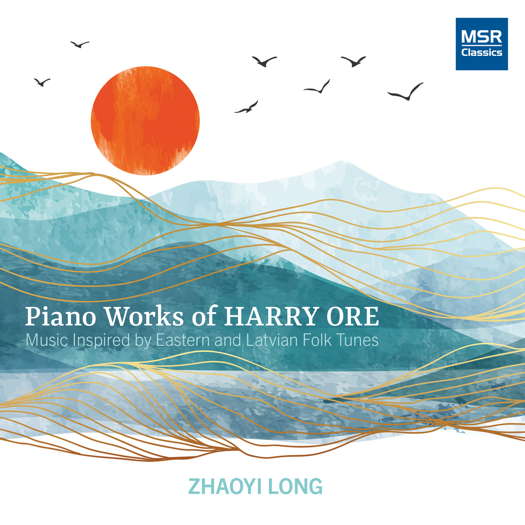 WORD SEARCH: Can you solve Allan Rae's classical music word search puzzles? We're currently publishing one per month.
WORD SEARCH: Can you solve Allan Rae's classical music word search puzzles? We're currently publishing one per month.
 DISCUSSION: What is a work? John Dante Prevedini leads a discussion about The performing artist as co-creator, including contributions from Halida Dinova, Yekaterina Lebedeva, Béla Hartmann, David Arditti and Stephen Francis Vasta.
DISCUSSION: What is a work? John Dante Prevedini leads a discussion about The performing artist as co-creator, including contributions from Halida Dinova, Yekaterina Lebedeva, Béla Hartmann, David Arditti and Stephen Francis Vasta.
 LISTENING TO TCHAIKOVSKY: Béla Hartmann uses his knowledge of Eastern Europe to argue against the banning of all Russian culture following Vladimir Putin's invasion of Ukraine.
LISTENING TO TCHAIKOVSKY: Béla Hartmann uses his knowledge of Eastern Europe to argue against the banning of all Russian culture following Vladimir Putin's invasion of Ukraine.

Considerable Variety
GEOFF PEARCE listens to music by Harry Ore, played by Zhaoyi Long
'Zhaoyi Long's playing generally was beautiful and she brought the character of these pieces to life.'
This disc was quite a find. I had not heard of Harry Ore (1885-1972) before. He was a Latvian composer and pianist who lived most of his life in Hong Kong. His early training was steeped in the Russian tradition, studying with Joseph Wihtol (1863-1948) and Anatoly Liadov (1855-1914). In 1915, he set out on a tour of the orient, starting in Harbin, then Shanghai and eventually settling in Macau and Hong Kong, where he would remain for the rest of his life. He taught many of the leading Chinese composers of his time and also toured many of the surrounding Asian countries, giving recitals, lectures and masterclasses. He composed in two different styles, the first principally drawing on Cantonese musical styles and the second, because he was patriotic and homesick sometimes, drawing on Latvian folk music. This CD contains examples of both.
The first piece on the disc is South China Fantasy – The Lady and the Flowerseller, Op 17 No 1. It is the earliest published work drawing on Cantonese music and was published in 1931. The story that this piece is telling is provided in the excellent booklet. It is a charming and well crafted little piece at just under five minutes in duration.
Listen — Harry Ore: South China Fantasy – The Lady and the Flowerseller
(MS 1841 track 1, 0:27-1:20) ℗ 2023 Zhaoyi Long :
Five South Chinese Folksongs, Op 17 No 2, a multi-movement suite, contains an arrangement for piano of five folk songs. 'Prayer of the Monks', the first piece, does not have any known origin in existing folk music. These short pieces have descriptive titles and the music is charming. The harmonic language actually reminds me of Percy Grainger's folk song pieces very often, even though, or course the melodic line is very different.
Listen — Harry Ore: The Raindrops Knocking at the Leaves of the Banana Tree
(Five South Chinese Folksongs)
(MS 1841 track 4, 1:03-1:41) ℗ 2023 Zhaoyi Long :
Two Southern Chinese Melodies, Op 18, was first published in the US in 1932 and has been republished a couple of times since - indication that these might have been popular pieces. The composer's arrangements are skilful, particularly as in traditional Chinese music the performers often play in unison, and Ore had to come up with a workable solution for piano.
Macau Lullaby, Op 19 is next. The origin is unknown, and the structure more western, perhaps because of the Portuguese colonisation of the city. The pianist shows her tenderness in rendering this performance It is in a gentle Habanera rhythm.
Listen — Harry Ore: Macau Lullaby
(MS 1841 track 9, 1:32-2:16) ℗ 2023 Zhaoyi Long :
Concert Suite based on Oriental Music, Op 23, comprises four pieces of about four minutes duration each. It was published in 1950. The four pieces are from different regions in Asia that the composer visited - Japan, South China, The Philippines and Indonesia (Portuguese Timor) respectively. They show considerable variety and are great character pieces.
Listen — Harry Ore: Indonesia: A Greeting from Portuguese Timor
(Concert Suite based on Oriental Music)
(MS 1841 track 13, 2:17-2:53) ℗ 2023 Zhaoyi Long :
The First Rhapsody, Op 6, completed in Hong Kong in 1921, is a powerful and virtuosic work (in the style of Liszt). After a tumultuous opening, the piece settles into a Barcarolle in which a song from Latvian composer Emilis Melngailis is quoted. It contains much contrast, with extremes of dynamics, changes of tempo and style. It is a piece that allows the pianist to show her formidable technical accomplishments.
Listen — Harry Ore: First Rhapsody
(MS 1841 track 14, 3:29-4:18) ℗ 2023 Zhaoyi Long :
The Second Rhapsody, Op 7, composed about two years after the first, is made up of two elements - the first a jubilant march-like theme, depicting the joy felt when Latvia got its independence from Russia, and the second a more tender, reflective minuet. Again, this piece requires considerable virtuosity. Both rhapsodies are a little too bombastic in parts for me, but certainly show the pianist's skill.
Listen — Harry Ore: Second Rhapsody
(MS 1841 track 15, 8:24-9:22) ℗ 2023 Zhaoyi Long :
Finally, Two Latvian Bagatelles, Op 21 were composed in 1930 and the pair contrast each other. The first is slow and reflective whereas the second is a little whirlwind of energy that will leave you quite breathless.
Listen — Harry Ore: Prestissimo (Two Latvian Bagatelles)
(MS 1841 track 17, 1:25-1:51) ℗ 2023 Zhaoyi Long :
This is a recording of a very skilled pianist playing music that was very new to me. It was good that there was some contrast in style, otherwise, by the end of this disc, I might have been tired of the works, as charming as they are. The two Rhapsodies provided that change. I did enjoy those pieces but found their bombastic moments a little too much. This was compounded by the recorded sound itself. At times, especially in loud and high passages, the sound was too brittle, and at the bottom end, it was sometimes a little muddy. Whether this is because of the recording engineer or the pianist, I am not entirely sure, but it did detract somewhat from my overall enjoyment. Zhaoyi Long's playing generally was beautiful and she brought the character of these pieces to life.
Copyright © 31 October 2023
Geoff Pearce,
Sydney, Australia



